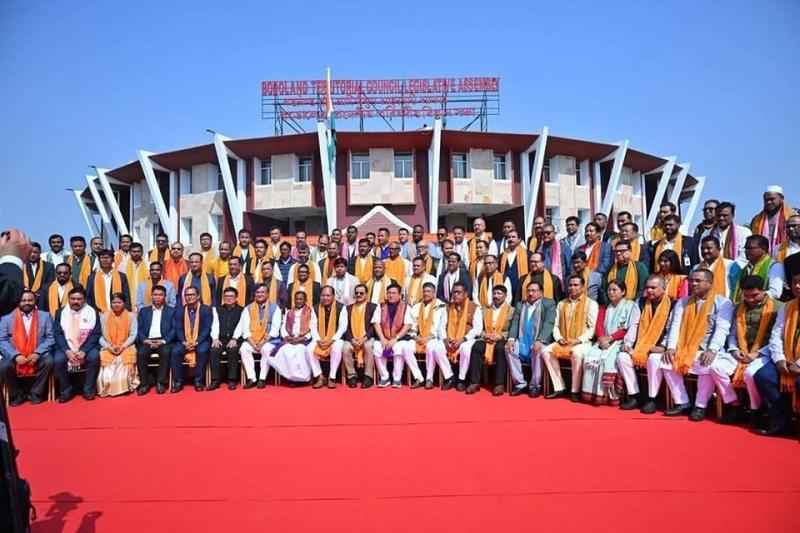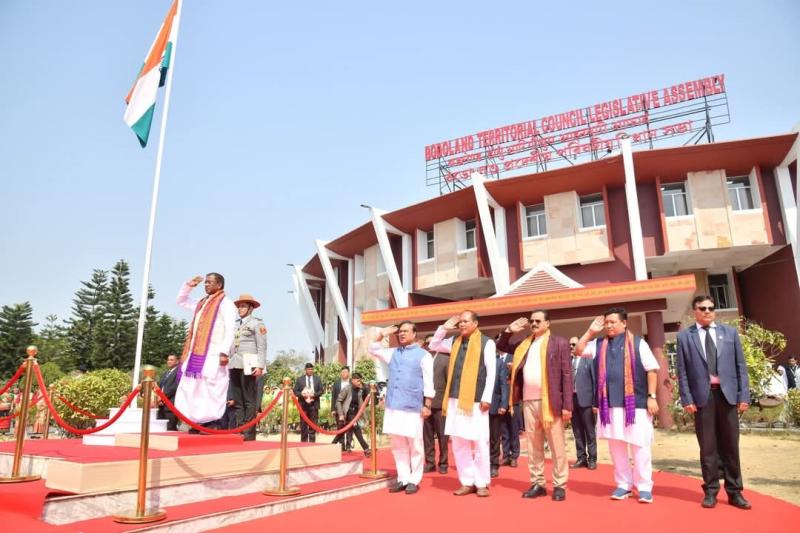Holding of the first ever session of the Assam Legislative Assembly at Bodoland Territorial Council (BTC) Legislative Assembly in Kokrajhar on February 17 is a symbolism that overshadows the autonomy of the Bodo autonomous council under the Sixth Schedule. This special session of the inaugural day of Budget Session 2025 of the Assam Assembly started with the address by Assam Governor Lakshman Prasad Acharya.
BTC is the only autonomous council among all ten tribal autonomous councils under Sixth Schedule in the Northeast region to use the term “Legislative Assembly” to denote the venue for conducting its business. BTC members are called as “Member of Council Legislative Assembly.”
The BTC Legislative Assembly symbolises the Constitutional autonomy enjoyed by the Bodos and other communities living in Bodoland Territorial Region (BTR) included in the list of Scheduled Tribes. Decades-long statehood movement of the Bodos led to political settlements for creation of the autonomous council under amended provision of the Sixth Schedule after Bodo groups spreading the statehood movement settled for territorial autonomy in lieu of a separate state.
 Photo courtesy : Govt of BTR (https://x.com/GovtofBTR)
Photo courtesy : Govt of BTR (https://x.com/GovtofBTR)
BTC has the constitutional mandate to make laws that apply to its jurisdiction which is limited to BTR in respect of 40 subjects delegated to it. The aspirations of the All Bodo Students’ Union (ABSU) and other Bodo nationalist organisations have still been unfinished as the council’s legislative autonomy remains to be fully proven. Bills passed by the BTC Legislative Assembly are yet to receive assent of the President after being reserved by Assam governor since 2005.
A special discussion under Speaker's initiative on “Socio-Economic and All-Round Development of Sixth Schedule Areas of Assam” during the special session of Assam Assembly in Kokrajhar also focussed on strengthening the three autonomous councils including BTC under Sixth Schedule in the state.
Describing the Assam Assembly making a departure and holding its session in Kokrajhar as “historic,” Assam Chief Minister Himanta Biswa Sarma called for celebrating the occasion insisting that “the dream of united Assam has ultimately (been) realised.” He said that Assam Assembly symbolises political unity of Assam and Bodoland today has become a symbol of unity and hope.
“Yesterday, we scripted history! The inaugural sitting of Budget Session of Assam Assembly in BTCLA was a resounding reaffirmation of the “Bodoland Model of Peace” and will be remembered as a milestone in BTR’s and Assam’s democratic journey, wrote BTC Chief Executive Member Pramod Boro on his social media post in “X.” Boro, a former ABSU president is also one of the signatories of the third Bodo Accord signed on January 27, 2020.
Speaker of the Assam Assembly Biswajit Daimary wrote in his “X” handle: “It is a great privilege for the people of Bodoland to host the first sitting of the Budget Session, 2025 in BTC Legislative Assembly. I hope that this will make our democracy more inclusive and vibrant.”
Apart from legislative power, the autonomous council also have executive, administrative and financial autonomy in respect of the subjects delegated to it by the State Government. In other words, BTC Legislative Assembly which transacts the business to approve the exercise of these powers symbolises the constitutional authority within the meaning and interpretation of the Sixth Schedule.
The symbolism of holding the first ever budget session of the Assam Assembly is intended to convey a message of peace and unity but runs the risk of giving rise to the impression of dilution of this constitutional power. The inaugural sitting of the budget session of the Assam Assembly in Kokrajhar in any separate venue other than BTC Legislative Assembly could have a different symbolic message. Use of the nomenclature “Legislative Assembly” by BTC is seen as assertion by Bodo groups to exercise the legislative autonomy of the council in BTR.
 Photo courtesy : Govt of BTR (https://x.com/GovtofBTR)
Photo courtesy : Govt of BTR (https://x.com/GovtofBTR)
The autonomy enjoyed by BTC has evolved through signing of the three Accords by the Central and State Government with organisations spearheading the Bodoland movement, influential student body ABSU and various armed groups including the erstwhile Bodo Liberation Tigers and erstwhile factions of the National Democratic Front of Boroland.
The third Bodo Accord articulated a new power and governance sharing formula among the central government, BTC and the state government. It empowers the BTC to have a say in appointment of Deputy Commissioners and Superintendents of Police in BTR although Home and Political Departments are the subjects not delegated to the BTC. The Accord also promises more legislative, executive, administrative and financial powers to BTC.
It was the second Bodo Accord signed on February 20, 2003, which led to Bodos getting territorial autonomy under the amended provisions of the Sixth Schedule after the ABSU rejected the first Bodo Accord signed in 1993, alleging that it failed to fulfil the aspirations of the Bodo people with demarcation of the boundary of the BTC areas left incomplete.
The bills passed by the BTC Legislative Assembly not getting the Presidential Assent was one of the reasons cited by the ABSU when it rejected the second Bodo Accord signed by the erstwhile BLT chief Hagrama Mahilary. He later joined politics after his militant group disbanded following signing of the second Bodo Accord, became CEM of BTC and remained in that position for three consecutive terms. Mahilary, who was dethroned in 2020 after present ruling party United People’s Party, Liberation led by incumbent CEM defeated his party Bodoland People’s Front, is making all efforts to return to power. The BTC polls are due in December.
The clamour for strengthening the autonomous councils under Sixth Schedule through enactment of The Constitution (125th amendment) Bill by the parliament has grown in the region. The bill pending in the Rajya Sabha since 2019 seeks to empower the autonomous councils under Sixth Schedule with more legislative, judicial, and executive power and allow these autonomous councils to receive fund disbursed under the Finance Commission’s recommendation directly from the central government.
The symbolism of Assam Legislative Assembly moving into BTC Legislative Assembly has the potential to trigger a fresh debate on limits of constitutional and territorial autonomy under the existing model of power sharing and governance in this backdrop ahead of the ensuing BTC polls.